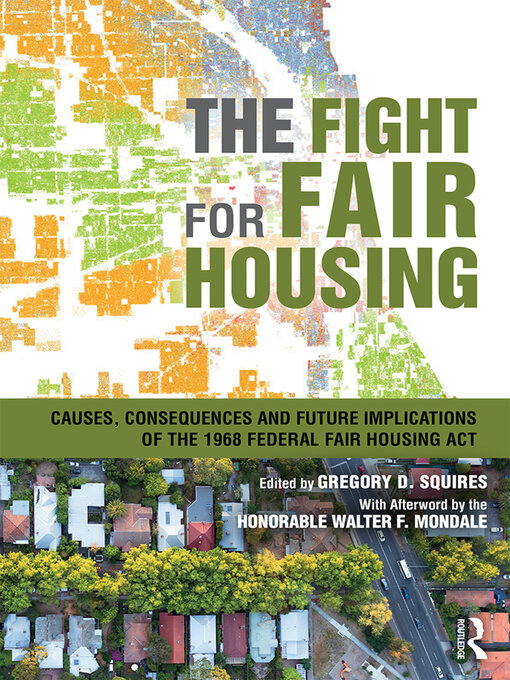American Battleground: Confronting Wealth And Power In The Fight For Fair Housing

Table of Contents
Historical Context: A Legacy of Segregation and Discrimination
The fight for fair housing isn't a recent struggle; it's a battle fought across generations, rooted in a long history of segregation and discriminatory practices. Understanding this historical context is crucial to grasping the persistent nature of housing inequality.
-
Redlining: This discriminatory practice involved denying services – like mortgages and insurance – to residents of specific neighborhoods, often based on race. Redlining maps literally drew lines around minority communities, effectively barring them from accessing crucial financial tools needed for homeownership. The lasting impact of redlining is still felt today, contributing significantly to wealth disparities between white and minority communities. Generations have been denied the opportunity to build wealth through homeownership due to this legacy.
-
Restrictive Covenants: These legally binding agreements, often included in property deeds, prohibited the sale or rental of homes to specific groups, usually minorities. Restrictive covenants were a powerful tool used to maintain racial segregation in housing, actively preventing minority families from integrating into predominantly white neighborhoods. The Supreme Court eventually deemed these covenants unenforceable, but their impact on housing segregation remains significant.
-
Government Policies: Government policies, both explicit and implicit, played a substantial role in perpetuating housing inequality. From discriminatory zoning laws to federally funded housing programs that actively excluded minorities, governmental actions exacerbated existing inequalities. These policies created and reinforced the systemic racism that continues to impact housing access today.
The Modern Face of Housing Discrimination: Subtle and Systemic Barriers
While overt forms of housing discrimination are illegal, subtle and systemic barriers continue to prevent fair housing access for many. These modern forms of discrimination are often difficult to identify and prove, yet their impact is undeniable.
-
Steering: Real estate agents sometimes steer minority homebuyers towards certain neighborhoods while subtly discouraging them from considering others, limiting their choices and perpetuating segregation. This practice, while illegal, remains a persistent challenge.
-
Predatory Lending: Minority communities are disproportionately targeted by predatory lenders who offer high-interest loans with unfavorable terms. These loans trap borrowers in a cycle of debt, hindering their ability to build wealth through homeownership and often leading to foreclosure.
-
Discriminatory Appraisals: Studies have shown that homes in predominantly minority neighborhoods are often undervalued compared to similar properties in predominantly white neighborhoods. This practice directly impacts the equity homeowners can build, further contributing to wealth disparity and perpetuating the cycle of housing inequality. This systemic undervaluation translates to less access to credit and reduced opportunities for wealth building.
The Power of Wealth and Influence: How Money Shapes Housing Policy
The battle for fair housing is also a battle against powerful interests. Wealthy developers, lobbying groups, and well-funded campaigns significantly influence housing policy decisions, often favoring the wealthy while neglecting the needs of low-income and minority communities.
-
Real Estate Lobbying: Powerful real estate lobbyists exert significant influence on housing legislation, often advocating for policies that protect their interests, even if those policies exacerbate housing inequality. This influence often translates into laws that prioritize development over affordability and equitable access.
-
Zoning Regulations: Zoning regulations, designed to regulate land use, can inadvertently contribute to housing inequality. Exclusionary zoning practices, such as minimum lot size requirements and restrictions on multi-family dwellings, limit the supply of affordable housing options, disproportionately impacting low-income individuals and families.
-
Campaign Contributions: Campaign contributions from real estate developers and other powerful interests can significantly shape the political landscape, influencing the decisions of elected officials and impacting the creation and enforcement of housing policies. This financial influence often tilts the scales against policies that prioritize equitable housing solutions.
Strategies for Achieving Fair Housing: Advocacy and Systemic Change
Achieving true fair housing requires a multi-pronged approach that combines legal action, community organizing, and significant policy reform.
-
Fair Housing Act Enforcement: Strengthening the enforcement of the Fair Housing Act is crucial. This involves increasing funding for fair housing agencies, improving investigative procedures, and imposing significant penalties for violations.
-
Community Organizing and Advocacy: Grassroots activism and community organizing are essential for raising awareness, mobilizing support, and demanding policy changes that promote fair housing. Community-based organizations play a critical role in advocating for the needs of marginalized communities.
-
Policy Change: Meaningful policy changes are needed to address systemic issues. These include reforms to zoning regulations, increased funding for affordable housing programs, and initiatives to address discriminatory lending practices. Examples of successful policy changes include inclusionary zoning ordinances, which mandate that a percentage of new housing units be affordable, and programs aimed at reducing predatory lending practices.
Conclusion
The fight for fair housing in America is a complex battle against deeply entrenched systems of wealth and power. Understanding the historical context, contemporary challenges, and the influence of money on policy is crucial to effectively addressing housing inequality. The legacy of redlining, restrictive covenants, and discriminatory government policies continues to shape our current housing landscape. Modern forms of discrimination, like steering, predatory lending, and discriminatory appraisals, maintain systemic barriers to fair housing access. Furthermore, the influence of wealth and power on housing policy often prioritizes the interests of the affluent, leaving low-income and minority communities behind.
We must all actively participate in the fight for fair housing. This requires supporting organizations working towards equitable housing solutions, advocating for policy changes that promote fair housing access, and challenging discriminatory practices wherever we encounter them. Join the fight for fair housing and help build a more just and equitable future for all, ensuring fair housing access and housing justice for every American.

Featured Posts
-
 Analyzing Trumps Claim Is Ukraines Nato Bid Doomed
Apr 26, 2025
Analyzing Trumps Claim Is Ukraines Nato Bid Doomed
Apr 26, 2025 -
 Nato Membership For Ukraine Trumps Doubts And Their Significance
Apr 26, 2025
Nato Membership For Ukraine Trumps Doubts And Their Significance
Apr 26, 2025 -
 How The Trump Administration Tried To Shape Europes Ai Policy
Apr 26, 2025
How The Trump Administration Tried To Shape Europes Ai Policy
Apr 26, 2025 -
 The Hollywood Strike What It Means For The Entertainment Industry
Apr 26, 2025
The Hollywood Strike What It Means For The Entertainment Industry
Apr 26, 2025 -
 January 6th Conspiracy Theories Ray Epps Defamation Case Against Fox News
Apr 26, 2025
January 6th Conspiracy Theories Ray Epps Defamation Case Against Fox News
Apr 26, 2025
